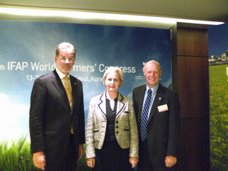The impact data of members of Mayawa in Kagera, demonstrate how farmers have increasingly been able to profit from potential positive regional marketing trends as a member of the farmers association. At the same time, the impact data illustrate that market studies have not been readily available when necessary, resulting in unexpected market shocks or unexploited opportunities for farmers. Also, volumes remain too limited to attract large buyers.
“Mayawa is a regional farmer organisation in Kagera, Tanzania, which is active in both rural and urban areas. It has received organisational support for several years since the 1990’s. Mayawa has contributed to introduction of small holder production of vanilla, mushrooms, rosella and jatropha in Kagera. Successes have been recorded, but they have not been fully exploited because of deficient market studies when introducing new crops. Still, a quantitative survey found that the average farmer income from non-traditional crops increased by 326% in the rural areas and by 441% in the urban areas. The average annual production of food crops increased with 17% and 5% for urban and rural districts respectively between 2003 and 2007. These gains cannot only be attributed to Mayawa. Mayawa has rather empowered farmers to make the most of the positive external influences. Despite the high production increase, the volumes are still too low to attract large buyers that require assurance of continued supply of reasonable quantities. There are initiatives underway for Mayawa to get an organic certificate for vanilla, which is expected to boost their marketing potential. The increased income has helped to improve the quality of housing of members: 54 % of the houses were made of bricks in 2007 against 30% four years earlier, 46% houses had mud walls compared to 70% four years earlier. 49% of the respondents own a phone now, 90% acquired this phone during the programme period and used it for market information. The major elements of further impact on farmers’ well-being are: improved food security, increased confidence, optimism and trust that have evolved over the years of the organisation’s existence.”
Friday, April 4, 2008
Subscribe to:
Posts (Atom)
Check these interesting contributions from other sites & blogs
- On Farmers Organization in Egypt
- Law on farmers Organizations in China
- Interview with FAO officials on Farmers Organizations
- Farmers use mobile phones
- comment of Kees Blokland on anti-CAP campaigning
- Poverty & growth blog of the World Bank
- Gapminder statistics visualized
- Guide for implementing ICT projects - iCommons december 2006
- Africa: tools of liberalisation - Patricia Daniel, University of Wolverhampton, England
- Business and the rural poor - Harvard Business School
- Profiling Asian Farmers Association members - Jan 4th, 2007
- Fiji Times report on AgriCord grants to Sugar Farmers - January 04, 2007
- Increasing Impact - marrying micro-credit and micro-insurance - The disconfort Zone, january 4th, 2007
- Programs that Fight Poverty - Institute for Advanced Technologies in Global Resilience - November 17, 2006
- University of Chicago Press Journals reports on GMOs - January 25, 2007
- Biotech crops to help reduce poverty - Kauser A Malik, in the Daily Times (Pakistan) January 25, 2007
- Why does China grow so fast - Michael Spence The Wall Street Journal 23 january 2007





